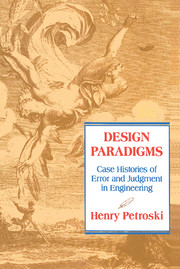Book contents
- Frontmatter
- Contents
- Preface
- 1 Introduction
- 2 Paconius and the Pedestal for Apollo
- 3 Vitruvius's Auger and Galileo's Bones: Paradigms of Limits to Size in Design
- 4 Galileo and the Marble Column
- 5 Galileo's Confirmation of a False Hypothesis
- 6 The Design and Collapse of the Dee Bridge
- 7 The Britannia Tubular Bridge
- 8 Failure as a Source of Engineering Judgment
- 9 The Design Climate for the Tacoma Narrows Bridge
- 10 Historic Bridge Failures and Caveats for Future Designs
- 11 Conclusion
- Bibliography
- Index
- Frontmatter
- Contents
- Preface
- 1 Introduction
- 2 Paconius and the Pedestal for Apollo
- 3 Vitruvius's Auger and Galileo's Bones: Paradigms of Limits to Size in Design
- 4 Galileo and the Marble Column
- 5 Galileo's Confirmation of a False Hypothesis
- 6 The Design and Collapse of the Dee Bridge
- 7 The Britannia Tubular Bridge
- 8 Failure as a Source of Engineering Judgment
- 9 The Design Climate for the Tacoma Narrows Bridge
- 10 Historic Bridge Failures and Caveats for Future Designs
- 11 Conclusion
- Bibliography
- Index
Summary
The development of failure-based paradigms can serve to define better the role of failure in the design process. Understanding how error has been introduced into past designs makes it easier to identify and eliminate it in future designs, and demonstrating how error has been consciously avoided by some of the most creative designers of the past provides models of good design for the future. When we understand both the negative and positive aspects of the role of failure in the design process, the process itself can be made to be more understandable, reliable, and productive.
Paradigms such as those presented here can also serve to unify a wealth of past experience of failure and failure avoidance that has generally escaped useful classification schemes. The value of case histories has long been appreciated, but the systematic use of them to benefit the next generation of designs can be elusive. By providing a new structure of paradigms within which case studies can be given broad interpretations across design specialties, a wealth of new experience is made available to design theorists and practitioners alike.
Design has been a notoriously problematic aspect of the engineering curriculum, and paradigmatic case histories provide a means of understanding and teaching the design process that can be structured according to a beneficial scheme. The scheme of paradigms and supporting case studies has the dual advantage not only of laying the foundation for organizing the mass of design experience for theoretical studies but also of providing caveats and models for the student and practitioner of design.
- Type
- Chapter
- Information
- Design ParadigmsCase Histories of Error and Judgment in Engineering, pp. 180 - 186Publisher: Cambridge University PressPrint publication year: 1994



